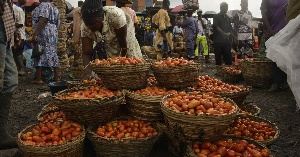Africa News of Friday, 16 May 2025
Source: www.ghanawebbers.com
Nigeria: Rising Food Prices Deepen Nigeria's Poverty Crisis
Authorities Should Strengthen Social Security
Several West African countries, including Nigeria, Ghana, Senegal, and Gambia, compete over the best "jollof rice." This dish is made with rice cooked in spicy tomato sauce. In Nigeria, jollof rice is becoming a luxury due to soaring inflation. Government support has been slow and inadequate.
Last month, SBM Intelligence released its latest SBM Jollof Index. The report tracked food costs from September 2024 to March 2025. It revealed that cooking one pot of jollof rice in Nigeria rose to ₦25,486 from ₦21,300. This is a 19 percent increase. Prices for essential ingredients like rice, onions, tomatoes, and peppers have surged.
Nigeria is facing its worst cost-of-living crisis in nearly three decades. According to PricewaterhouseCoopers' January 2025 report, inflation and weak social protection could push up to 13 million Nigerians into poverty this year. Recovery from economic issues caused by the Covid-19 pandemic has been hindered by poor policy decisions. One major decision was the abrupt removal of a fuel subsidy in 2023 without sufficient compensatory measures.
While moving away from fossil fuel subsidies is important, governments must provide adequate support for low-income households. These measures should help people access essentials like power and transport as costs rise after subsidy removal.
Nigeria lacks a comprehensive social security system that guarantees income support throughout life. As of 2022, only 14.8 percent of the population had access to any social protection benefit. In October 2023, the government announced a ₦25,000 monthly cash transfer for three months to help 15 million households cope with inflation. However, only about 5 million households have received payments so far.
A government official stated that implementation has been slow due to efforts to improve accountability. They are linking the National Social Registry with the National Identification Number system to identify "the poorest among the poor." Such programs can be costly and often exclude many who need help.
Authorities should work towards building a universal rights-based social security system instead. This system should be backed by clear strategies and progressive funding for comprehensive support. Only then can staples like jollof rice remain accessible for everyone rather than just a privileged few.
Anietie Ewang
Researcher
Africa Division











